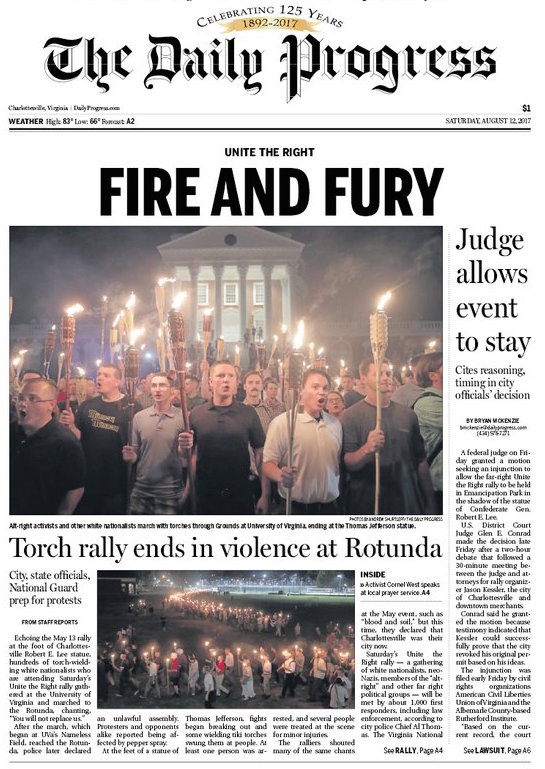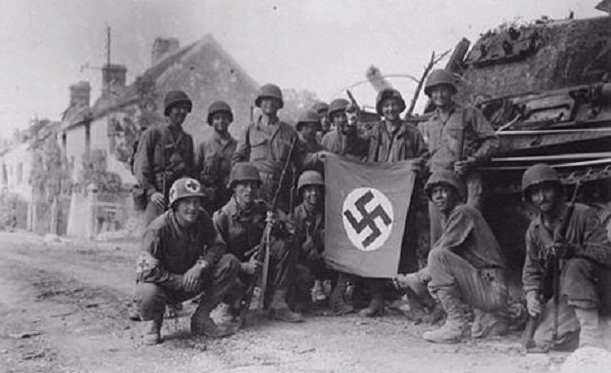Eight months into his presidency, Donald Trump’s credibility may have evaporated at a crucial time, when moral leadership is more important than ever. Could the death of Heather Heyer in Charlottesville represent a tipping point?
“If you’re not outraged, you’re not paying attention.”
The final public message on Heather Heyer’s Facebook page is one of those evergreen quotes that are used countless times to react to countless events.
Yet at vigils around the country over the weekend, thousands of people showed they are outraged; both by what happened in Charlottesville and the official reaction to it from a President who many now see as having surrendered any sense of moral leadership.
By initially condemning violence “on many sides” Trump’s failure to call out white supremacists left many speechless on what was widely described as the administration’s worst day, yet one that formed part of a depressing pattern. As MSNBC’s Steve Benen wrote:
His response to last year’s attack in Orlando – the deadliest mass shooting in U.S. history – was pathetic. His reaction to the attack in Nice, France, was every bit as foolish. The Republican president’s response to recent terrorism in London quickly became an international embarrassment.
The common denominator, of course, is that Donald J. Trump is useless to a cringe-worthy degree in times of crisis, but Saturday’s developments added another dimension to the problem. The president, faced with a seemingly easy opportunity to do and say the right thing, shrunk. Confronted with Nazis on American soil causing deadly violence, Trump was the one thing he swears he is not: weak.
So many controversies surrounding this White House are tied together by allegations of corruption, but this was a case of Trump demonstrating moral corruption, calling into question not just what the president did, but who he is.
The nation’s peaceful yet quietly angry vigils calling for healing stood in stark contrast to the torchlight protest at the University of Virginia on Friday night which acted as a catalyst for the weekend’s tragedy, representing what ProPublica (which has done excellent work recently on covering hate crimes) said was “a new incarnation of the white supremacy movement.”
 Charlottesville’s local paper, The Daily Progress, used its dramatic front page headline to echo a recent Trump statement, but placing it in a jarring domestic context. As the expected confrontation unfolded the next day, for a President who has been traditionally quick to take to Twitter when he feels personally attacked, the silence was deafening.
Charlottesville’s local paper, The Daily Progress, used its dramatic front page headline to echo a recent Trump statement, but placing it in a jarring domestic context. As the expected confrontation unfolded the next day, for a President who has been traditionally quick to take to Twitter when he feels personally attacked, the silence was deafening.
Earlier in the week, don’t forget, Trump had also been criticized for failing to acknowledge a bombing at a Minnesota mosque. Later, his controversial adviser Sebastian Gorka compounded the criticism by suggesting the attack may have been a “false flag.”
With white nationalists celebrating the President’s soft words and lack of direct condemnation of them, former KKK leader David Duke was in no doubt about what the rally – ostensibly to protest plans to remove a Confederate statue – represented. “We are going to fulfill the promises of Donald Trump. That’s what we believed in. That’s why we voted for Donald Trump, because he said he’s going to take our country back.” Duke later tweeted directly to Trump, recommending him to “take a good look in the mirror and remember it was white Americans who put you in the presidency, not radical leftists.”
The reaction from other politicians – across both parties – was swift, and as robust as you might expect; (there were some interesting nuances – while Paul Ryan specifically mentioned “white supremacy”, Mitch McConnell did not, for example) yet, as a whole, the contrast generally served to highlight the emptiness of the presidential response.
Charlottesville’s Mayor even partly blamed Trump for emboldening those taking part in the protests. “Look at the campaign he ran,” Michael Signer told CNN. “Look at the intentional courting both, on the one hand, of all these white supremacists, white nationalist groups like that, anti-Semitic groups. And then look on the other hand, the repeated failure to step up, condemn, denounce, silence, you know, put to bed all those different efforts.”
The Washington Post’s Jennifer Rubin wrote that: “Trump’s dance with the racists is … inseparable from his agenda. A nativist, populist president without the support of the most extreme defenders of Christian white America would be an impossibility.”
Virginia Governor Terry McAuliffe had strong words for the protesters but found himself under pressure over local law enforcement’s response to the situation. Wrestling as politicians do with the challenge of reconciling public safety with the First Amendment, McAuliffe admitted that the camouflaged militia members with assault rifles who had showed up (Virginia is a firearm open-carry state) “had better equipment than our State Police.”
Eventually, on Monday afternoon, Trump made a second statement that, while specifically condemning white supremacist groups, was at best a weak follow-up, seemingly made under pressure and inspired by self-interest. It was criticized as being too little too late, while one Twitter observer commented: “Today, TelePrompTer became President.”
(Trump’s statement also came only after he took the time to launch a Twitter attack on Merck CEO Ken Frazier – who is African-American – who that morning had issued a statement that in light of events in Charlottesville, he was resigning from the President’s American Manufacturing Council. Two other CEOs, from Intel and Under Armour, also withdrew late on Monday.)
The reaction to Trump’s second statement prompted him to tweet: “Made additional remarks on Charlottesville and realize once again that the Fake News Media will never be satisfied…truly bad people!” This in turn led veteran journalist Dan Rather to respond: “When it comes to choosing sides between Nazis, Klansmen and violent bigots on one side and an American institution our Founding Fathers enshrined in the First Amendment – a free and independent press – I know what side I choose. I am not sure about President Trump.”
As if the spectre of racial violence and domestic unrest wasn’t enough, the world appears no closer to a resolution of the North Korea crisis, with the FT’s Gideon Rachman warning that Trump could seek to “exploit an overseas conflict to distract from problems at home”
But amid the escalating rhetoric last week over North Korea – and then, unexpectedly, also Venezuela – a new poll got a ripple of attention. In the context of subsequent events, it deserved more.
The Washington Post reported that “half of Republicans would support postponing the 2020 election if Trump proposed it.”
Roughly half of Republicans also believe that Trump won last year’s popular vote, and his frequent assertions of “illegal” voting led him to establish his Commission on Election Integrity, prompting pushback from a number of states against providing the voter information requested. But the end result may simply be to muddy the waters on perceptions of the reliability and trustworthiness of our elections, particularly in the context of an ongoing investigation into possible Russian meddling.
Largely through his own actions, Trump’s personal trustworthiness is staggeringly low. What better way to ameliorate that than by muddying those waters surrounding national institutions?
Yet with his approval ratings sinking to fresh lows, Team Trump is on the narrative offensive, the latest “campaign” ad attacking Democrats and the media as “enemies” preventing the President from doing his job.
Flags, statues and messages from the past
A friend of mine reminded me this week that shortly after Trump’s election victory last year, I gave her a copy of Sinclair Lewis’s satirical novel “It Can’t Happen Here” written in 1935, foretelling the rise of a charismatic demagogue who invades Mexico. Meanwhile, HBO is developing a series, “Confederate” featuring an “alternate timeline” where southern states have seceded from the Union.
But let’s cut to the chase. Apart from on the screen, the only time a Nazi flag should be held by an American is when it has been captured in battle. (h/t Michael Keyes/Twitter)

The sight of the Swastika being openly displayed on the streets of an American city was a source of understandable hurt to many.
Here, we understand all too well how wrapping oneself and one’s behaviour in a flag – any flag – changes the conversation. (Even if you claim you don’t understand what a flag stands for, isn’t that all the more reason not to fly it?)
When questioning the use of the Confederate battle flag, though, the counter-argument of “heritage” has long been the traditional response. Similarly with monuments to Confederate leaders; the statue of Robert E Lee in Charlottesville was the spark that ignited the weekend’s violence, and those monuments are now back in the spotlight as a result.
On Monday, protesters toppled a Confederate memorial in Durham, North Carolina, while the Mayor of Lexington, Kentucky, said he wants to remove and relocate two statues in his town, but acknowledged that doing so could have dangerous consequences. The Mayor of Baltimore, meanwhile, is to move ahead with removing all four Confederate monuments in the city, using the example of New Orleans, whose Mayor said that his city’s statues “..were a part of … terrorism as much as a burning cross on someone’s lawn.”
Writing about the issue in The Atlantic at the weekend, Yoni Appelbaum says:
The myth of [post-Civil War] reunion was built around this understanding, that the nation should treat both sides in a war that killed three-quarters of a million Americans as equal, or at least not inquire too closely into the merits of each cause. And that unity would come not from honestly grappling with events, but from studiously ignoring injustice, and condemning those who oppose it as hateful…
And ultimately… the statues will be moved, the streets renamed, and the military bases will honor patriots who fought for their country and not against it. Because a century and a half after Reconstruction began, America is still working on the project of constructing a more equal society, and reinvesting in the experiment of a multi-ethnic democracy.
The white nationalists in Charlottesville hoped to halt this project. Instead, they have simply given it fiercer, redoubled urgency.
Race has been a constant political debate in the US, and it’s perhaps never been more important as it is now. And in the context of last year’s election and the national forces that shaped its outcome, it is being played out across more than a simple geographic demarcation. It’s not just about “the South”.
The next white supremacist rally is scheduled for this coming Saturday at Boston Common, with a number of the speakers from the Charlottesville event expected to be in attendance. A counter-demonstration is also planned. This struggle for the soul of the country appears to have further to run.
But, as Heather Heyer would undoubtedly applaud, people are most definitely paying attention.
Also published on Medium.
